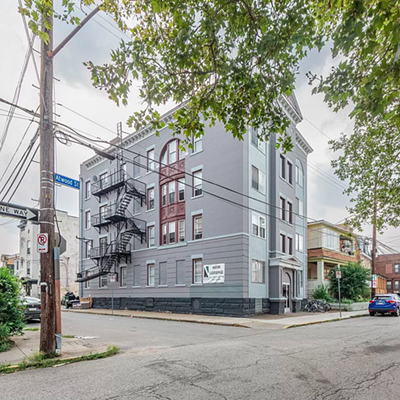Thursday, February 25, 2010
Students try to pressure Casey on college-loan debt
When four University of Pittsburgh seniors traveled to Senator Bob Casey's office Downtown today, they weren't looking for extra credit. They were hoping, instead, for a bit less debt.
OK, I promise to swear off cheesy education-related metaphors for the rest of this blog post. Which is an object lesson -- sorry! -- in how tough it is to take on one of the nation's most powerful industries.
The average college student graduates with debt of more than $20,000. In fact Krystal Mitchell, one of the students who came Downtown, racked up that much debt in her senior year alone. Paying for her final year of school compelled her to borrow $20,000 from PNC, doubling her debt load. "And I come from a two-parent, two-income household," said Mitchell, who as a Washington D.C. native pays Pitt's out-of-state tution.
Mitchell and the other students were pressing Casey to suport House Resolution 3221, the Student Aid and Fiscal Responsibility Act. That bill would make college more affordable by increasing the funding for financial aid programs like Pell Grants. It would also overhaul the current federally-funded student loan system.
Under the current set-up, banks issue loans to students, collecting fees and interest -- but if students default, the government guarantees to pay the banks off instead. HR 3221 would cut the banks out of the action: Since the government guarantees loans anyway, it would loan the money directly. That would save an estimated $8 billion a year currently being spent on private-sector administrative costs and stock dividends -- savings that would be plowed back into student aid.
But while the bill is part of Barack Obama's ambitious legislative agenda, it's been languishing since last summer. After being approved by the U.S. House of Representatives, it ended up in the Senate's committee on Health, Education, Labor and Pensions (HELP). Casey sits on the committee, which has been no HELP at all.
Students said that while Casey's staff was sympathetic, they heard little in the way of promises. "Casey is in support of increasing Pell Grants, but he was still iffy on the direct loans -- which is the main thing," Nila Devanath says she was told. Among Casey's main concerns, students said, was the financial-sector job losses that would result if government took over lending. (After all, how are those folks going to pay back their student loans?)
I've got a call in to verify the students' account of Casey's position. (UPDATE: Casey's office furnished me with a statement, sort of; it's in the comments below.) But it's consistent with Casey's previous actions. Last year, Casey proposed a variant of the Obama legislation: In his version, the banks wouldn't be cut out entirely. They'd originate the loan and then sell it to the government soon after -- with a handling charge tacked on.
That handling charge would cost an estimated $420 million a year, money that might otherwise be spent on educating students. But "We have an eye on the jobs" Casey spokesperson Larry Smar has explained.
Backers of the plan say it still gets Obama about 95 percent of the savings he hoped to realize, and it helps offset fears of a "government takeover." It also can't hurt that student-lending behemoth Sallie Mae has a loan-servicing facility in Wilkes-Barre. That's just next door to Scranton, which is Bob Casey's hometown. It's also in the district of US Rep. Paul Kanjorski -- who just happens to sit on the House Financial Services Committee.
I'm guessing there's at least one poli sci grad over at Sallie Mae. (ADDED: I guess I should mention -- in case you were wondering -- that Kanjorski was one of the very few Dems to vote against this bill in the house.)
Still, the Pitt students held out some hope that Obama's bill could pass in the weeks ahead -- perhaps as part of the same reconciliation process that Democrats may use to pass health care.
I wouldn't hold my breath. From what I can tell, the Senate won't even start talking about the bill until mid-March. And the ranking Republican on Casey's committee, Mike Enzi of Wyoming, has already warned that savings from HR 3221 have been overstated. "The more we learn about the fiscal implications of a government student loan monopoly, the more reason there is to be concerned," Enzi said last year. "Competition and free market solutions increase access to lending options."
So do pawn shops, of course. And the United States Student Association, which organized today's event, is planning future events to keep the issue in the public eye. But organizing students ain't easy. The Association's press relase promised "20-30 students" from area colleges. Yet other than a USSA representative, the only attendees were myself, the four Pitt students, and a guy who walked up and began asking us what was going on, explaining that he "just wanted to trash Ed Rendell." (Devanath explained that Thursdays are a heavy class day. As for the Rendell-bashing dude, I'm currently thinking about offering him a blog on our site.)
And in some ways, the students in college were the lucky ones: At least they could find the money, even if they had to borrow it.
Marcus Simpson, of Pittsburgh's North Side, graduates this spring with $20,000 in debt. "It's not an excessive amount," he said. Especially when you consider "There are a lot of people in my neighborhood who can't afford the opportunity at all."
Tags: Slag Heap









